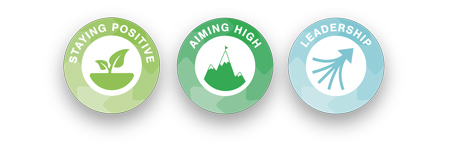Positive Self-Esteem for High Potential Learners – How to Help Them Believe and Thrive
Self-esteem can be summarised as the opinion we have of ourselves. Positive self-esteem is the foundation for healthy self-confidence, general contentment and a sense of fulfilment in life. It also feeds into traits like motivation and leadership. What marvellous things to have!
Exciting, too, for parents, carers and teachers because a major aspect of a child’s self-esteem stems from feeling loved and valued in their early years. Experiences in the home are a key part of this and build (or damage) their comprehension not just of their personal value, but also their sense of being worthy of respect and having ‘power’ as an individual – for example, by seeing their behaviour and wishes affect our actions as adults (this is not the same as them simply getting their own way). Knowing this, we can nurture our young people and watch them blossom.
Self-Esteem
Self-esteem is formed over many years and shaped by life experiences and the norms of our educational, religious and family culture(s). Over time, it is shaped further as a young person forms stronger opinions about their personal competence (or ‘efficacy’). The hope would be for these elements to combine in the high potential learners we care for to create strongly positive self-esteem that underpins level-headed self-belief and informed self-confidence in their ability to cope with challenges.
As years pass, the enduring traits of “global” self-esteem gradually become more entrenched. However, a young person’s “selective” self-esteem may yet cause wobbles (or peaks) while their values take on different ‘weightings’ in response to key temporary situations or passing moods. Being well-grounded in their values and secure in their principles will help them weather these potential storms, reduce their general worry level and limit unhelpful defensive reactions.
Maslow and Motivation
Maslow’s well-known ‘Hierarchy of Needs’ places ‘esteem’ as the fourth of five sequential levels of requirement in life: Physiological, Safety, Social, Esteem and finally Self-Actualisation (or achieving one’s full potential). It is worth considering that until your child’s physical, safety and social needs are met, they may not have the opportunity to embrace positive self-esteem.
Similarly, Maslow’s model may suggest that a high potential learner is unlikely to be motivated until they are fully achieving, and all lower-level needs are met. Self-actualisation might be the only point at which they are able to stretch their performance, aim for truly challenging goals and feel genuinely proud of their work. Combined with positive self-esteem, this would be a very powerful thing; for your motivated learner to expect to do well, yet be resilient to setbacks.
Growing Up
Life experiences inform a young person’s developing values and self-esteem. The US National Association for Self Esteem describes how “children typically value feelings of being likable and lovable, valuing the feedback received from parents or other significant adults. As we approach adolescence their attention begins to shift […] to the feedback received from their peers. For example, girls at this time typically value their appearance and their popularity with their peers, while boys typically value their athletic prowess.“ [i]
Through teenage years, our dependence on external feedback declines and we develop our own criteria, integrity and sense of success.
With positive self-esteem and healthy self-confidence, a young person with high learning potential is perfectly placed to become a good role model and strong leader. They can act responsibly and consistently, able to motivate others and gain their trust and respect. They will be able to weather self-doubt and remain balanced during squabbles, not succumbing to angry defensive reactions.
Self-Esteem and High Learning Potential
Having the potential to learn quickly and deeply can be a mixed blessing and actually hinder a child’s ability to judge their ‘worth’. They may be proud of themselves one minute, then told implicitly or directly by a parent to dial down their enthusiasm or by a teacher to keep quiet about their pre-existing knowledge on a subject. Parents, carers and educators can help greatly by allowing these children to be themselves – and celebrated for it!
A core part of emerging self-esteem relies on a child’s “social comparison” of their capabilities and attributes compared to peers. Having perhaps become used to being the top-performer in the classroom or Home Education setting, able students of all ages need to be prepared and supported when they enter a learning environment with fellow intellectually-gifted learners. Previously high self-esteem may crash to a devastating low and cause total demotivation, confusion and even depression or a desire to quit.
Continued motivation is key and, alongside high self-esteem, has been confirmed as a fore-runner to academic success. A study of gifted Turkish students found significant correlations, as the resulting extract explains: “Using a regression analysis, in fourth graders general self-esteem, in fifth graders academic self-esteem, in sixth and seventh graders intrinsic motivations and in eighth graders extrinsic motivation were found to predict academic achievement.” [ii]
Negative Self-Esteem
Many experiences with our loved ones, educators and even strangers can knock our self-esteem. A huge influence on young people these days, too, are the constant mixed messages from social media and television; as human beings we seem to be vulnerable to believing ‘bad press’. On top of this, illnesses, stress or difficult life events can negatively affect our outlook.
Furthermore, some children just seem to find it naturally harder to believe in themselves. Some might set impossibly high standards for themselves against which they always feel they are failing; a frequent example of this in high potential learners would be a crippling tendency towards perfectionism.
The NHS has online resources dedicated to ‘How to have healthy self-esteem’ at https://www.nhs.uk/conditions/stress-anxiety-depression/raising-low-self-esteem/. You could mentor your child through these stages. First, they should unravel and note down some unhelpful, negative self-beliefs. Next, help them find evidence that this thinking is flawed. Following this, they then write down some positives about themselves. Aim for at least 5 positives and display them as a reminder.
If you feel that negative self-esteem is a particular problem for your child and might be leading to low mood or depression, contact your GP and get advice from reputable sources, such as those below. There are some real-life stories from young people at https://healthtalk.org/depression-and-low-mood/depression-self-and-self-esteem.
Techniques to Try
- At the start and end of each day, have them happily say: “I Believe in Me!”
- Ensure they feel loved and valued.
- Show they are worthy of respect and that their input matters and influences outcomes.
- Be an excellent role model and cultivate positive self-esteem in yourself.
- Nurture their social and emotional development and give them appropriate academic challenges.
- Depending on age, ask or help them to make attractive flashcards of positive beliefs they hold about themselves. -You could start with “I Believe in Me!”
- Hang these ‘positive affirmations’ or other quotes in prominent places.
Resources to Help You to Help Them
Consider attractive template books such as:
- I am Amazing: A Coloring Book for Kids: Positive Affirmations to Boost Your Child’s Self Esteem; F Pascual
- I Am Strong, Smart & Kind: A Coloring Book For Girls; Great Girls Press
- Boys Are Amazing: An Inspirational Coloring Book for Boys to Motivate, Encourage and Build Confidence; Jade Summer Kids
Activities to boost self-esteem and self-confidence:
- Be Positive! Mindful Kids; Coombes & O’Shea
In-depth, guided workbooks:
- You’re a Star: A Child’s Guide to Self-Esteem; P O’Neill
- Self-Esteem Workbook for Teens: Activities to Help You Build Confidence and Achieve Your Goals; L M Schab
- The Ultimate Self-Esteem Workbook for Teens: Overcome Insecurity, Defeat Your Inner Critic, and Live Confidently; M Maccutcheon
Further Reading:
- Helping to Raise Self-Esteem in High Learning Potential Children. (Potential Plus UK advice sheet at https://potentialplusuk.org/index.php/product/pa602-helping-to-raise-self-esteem-in-high-learning-potential-children/)
- Tips for Parents: Self-Esteem of the Gifted. (Dr M Muratori and the Davidson Institute at https://www.davidsongifted.org/search-database/entry/a10679)
- How to Kick-Start Motivation. (Blog from Potential Plus UK at https://potentialplusuk.org/index.php/2020/06/11/how-to-kick-start-motivation/)
- Supporting Dual or Multiple Exceptionality. (Potential Plus UK resources at https://potentialplusuk.org/index.php/families/dual-or-multiple-exceptionality/)
Useful Websites:
- Social Self-esteem and Gifted Kids. (Institute for Educational Advancement at https://educationaladvancement.org/blog-social-self-esteem-gifted-kids/)
- Developing Self-Esteem in Gifted Teens. (Melanie Brown Kroon and the Summit Center at http://summitcenter.us/developing-self-esteem-in-gifted-teens-by-melanie-brown-kroon-lmft/)
- How Self-Esteem Develops. (National Association for Self-Esteem, USA, at https://healthyselfesteem.org/about-self-esteem/how-self-esteem-develops/)
- Self-esteem and Motivation – Maslow’s Hierarchy of Needs. (The Psychology Notes HQ at https://www.psychologynoteshq.com/maslowhierarchyofneeds/)
- Raising Low Self-Esteem (The NHS at https://www.nhs.uk/conditions/stress-anxiety-depression/raising-low-self-esteem/)
- Low Self-esteem. (Vulnerabilities and the Gifted Child at https://vulnerabilitiesandthegiftedchild.weebly.com/low-self-esteem.html)
– And don’t forget just to have fun saying and hearing: “I Believe in Me!” –
References
[i] National Association for Self-Esteem (USA) How self-esteem develops. https://healthyselfesteem.org/
[ii] S Topçu and M Leana-Taşcılar (2016) The role of motivation and self-esteem in the academic achievement of Turkish gifted students. Gifted Education International

About the author: Gillie Ithell is a writer and editor for Potential Plus UK with a B.A. degree in Modern Languages & Communication. Having worked internationally as content manager of classic board games and ‘edutainment’ software, Gillie now writes to inspire others like herself; on a daily journey with High Learning Potential.






